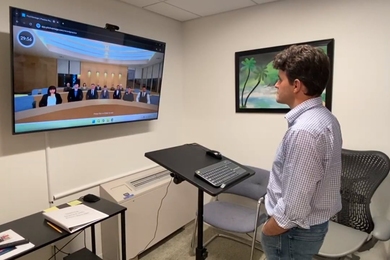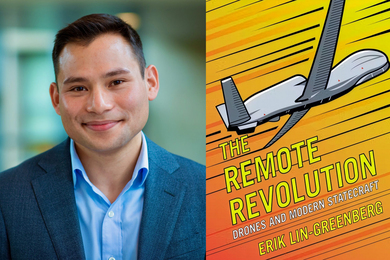The military-industrial sector is undergoing "a dramatic, stunning reduction" in size which will continue for the next five years, Deputy Defense Secretary John M. Deutch said at an MIT conference last week.
"The defense sector is changing in this country in a way that is revolutionary and has interesting interaction with the civilian economy," he told the MIT International Conference on the Future of Industry in Advanced Societies at a dinner meeting held at the Museum of Fine Arts.
"An incredibly important trend in defense," Dr. Deutch said, is the decision to abandon military specifications for the acquisition of about 72 percent of what the Pentagon buys-food, clothing, batteries, computers, software and other goods. "The civilian [quality] level of product is higher than what can be maintained in the small defense-sector market," he said.
Military purchasing specifications (made infamous by the $600 toilet seat scandal a few years ago) are needed only for weapons and high-security battlefield items, he said. In response to a question about purchase of foreign products and systems, Dr. Deutch said, "We do it all the time."
Dr. Deutch, former MIT provost and nominee for the director of the Central Intelligence Agency, noted that government defense expenditures are now at a historic low of three percent of Gross Domestic Product compared to seven percent at one time. Defense is now 25 percent of the national budget, whereas "when I entered government in 1961, it was 50 percent," he said.
Military and defense employment has gone through a sharp reduction in the past five years, he said. Active-duty military personnel have dropped from 2.2 million in fiscal year 1989 to 1.6 million in fiscal 1994 and is expected to be 1.4 million in fiscal 2000. Civilians in the Department of Defense have gone from one million to 900,000 and are expected to number 600,000 in five years. Defense contractor employment has diminished from 3.5 million in 1989 to 2.5 million in 1994 and is expected to be at 2 million in 2000.
Using defense as an analogy for the future of industry, Dr. Deutch said information and intelligence are vital. "The DOD has an archaic system of financial management, not comparable to MIT's excellent system."
As a Pentagon official, "you don't have the financial data to allow you to make an intelligent decision even if the political structure would let you," he said, emphasizing that Secretary of Defense William Perry "is going to change this."
Dr. Deutch said that "dual use technology" for military and civilian purposes has "win/win military and commercial applications. We need to cooperate to share investment costs because of the increased pressure to reduce the budget. The DOD has an interest in developing technology that will benefit both sectors such as flat- panel computer displays, microelectric mechanical systems, high- performance computing.
This brings "screams about industrial policy. Bill Perry and I plead guilty-that's exactly what we are doing," Dr. Deutch said.
"The Defense Department is downsizing and is going to have to be more creative, more modern, more imaginative if it's going to meet the security needs of this country," he concluded.
More than 200 business, government and academic leaders from the US and abroad attended the two-day conference, sponsored by the MIT Industrial Performance Center.
"The relationship between industry and society in Asia, Europe and the United States is changing in fundamental ways," said Dr. Richard Lester, professor of nuclear engineering, director of the center and co-chair of the conference with Dr. Suzanne Berger, professor of political science and director of the MIT International Science and Technology Initiative.
"One of the most exciting things about the conference was that it began to point towards new and more useful criteria for measuring progress at both the enterprise and national levels. The most successful companies will be those that establish a balance between restructuring and building for the future. Both firms and governments will need to pay much more attention to their effectiveness in making use of new technologies, as distinct from their skill in developing them in the first place," Professor Lester said.
A version of this article appeared in MIT Tech Talk on April 12, 1995.





